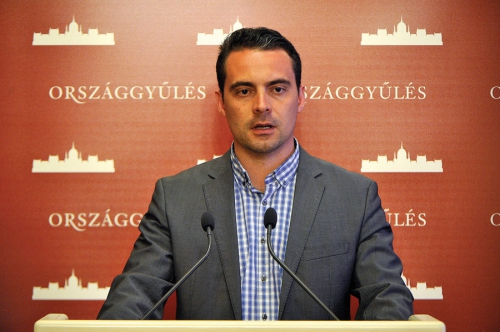
Julius Evola’s Influence on Jobbik and Gabor Vona
Ex: http://islam-freemasonry.com
The Budapest Times has just published an article on the “esoteric” influence on Gabor Vona, the leader of Hungary’s controversial Jobbik Party, and Tibor Imre Baranyi, Vona’s advisor. Of particular importance to the journalist is the influence of the founder of the school of Traditionalism, Rene Guenon, and, more especially, Julius Evola, one of the more popular yet more frequently criticized of Traditionalist thinkers.
According to the Budapest Times, Baranyi is Vona’s official advisor, and receives a monthly gross salary of HUF 189.878 (if this is correct, that’s about $0.67 USD according to various online currency exchange sites). He is also the owner of Kvintesszencia, a publishing house in Debrecen, which has published some of Evola’s work. The Budapest Times say that,
Evola was in close contact with the SS during World War II and worked for the Study Society for Primordial Intellectual History, German Ancestral Heritage founded by Heinrich Himmler.
By the way, Vona wrote a passionate introduction for the Evola compilation published by Kvintesszencia..
This seems to be an oversimplification. Evola was close to elements in Italy’s Fascist party, and lectured to the SS, though his views were seen as incompatible with Nazi racialism, and his activities in Germany were effectively stopped. Evola saw “race” in spiritual terms, or terms of character and inclination. This may seem unsavory to us today, and while many of Evola’s opinions — such as they were influenced by the Protocols of the Elders of Zion, etc. — may have been wrong, these not unusual for his time, either on the Left or Right.
What’s important, when considering Evola’s influence, is the broad range of material he produced, some of it bad, some of it interesting. Evola’s books have been largely published by Inner Traditions, an occult/New Age publisher, since most of his work concerns spirituality, from Buddhism and Islam to Hermeticism, all of which he speaks about positively.
Without understanding this — and the Budapest Times certainly doesn’t seem to — it is difficult to understand what Evola’s impact may be on Vona. Speaking about Traditionalism, the newspaper says:
The doctrine likes to take examples from Buddhism, Hinduism, Islamic tradition and other directions of religion in order to compare the dilapidation of the Western world against something. The person who combined many different spiritual movements in such a way and is considered as the icon of traditionalists today is the Frenchman René Guénon (1886-1951). Guénon spent his late years as a Muslim Sufi mystic under the name Abdel Wahid Yahia in Cairo, the Egyptian capital becoming the final destination of his spiritual movement.
Vona does not seem to really mind that the traditional school based on the global synthesis of different religious directions and spiritual-cultural tradition contradicts the official Jobbik image of being “Christian and Hungarian”. He himself follows the “metaphysical tradition”. A couple of months ago this is what he told weekly newspaper Heti Válasz: “Every larger global religion has a core truth which is the same as in the other ones and in most cases it’s called God. Everyone has the task to get as close to God as possible in his own cultural circle and within his own faith. As a Hungarian, European and Roman Catholic person I have the same task. However, at the same time I pay attention to, study and understand other cultures and religions too.”
This again mischaracterizes Guenon and Traditionalism. Guenon — who was at one time involved with esoteric Freemasonry, and who later “moved into” Islam — did not “combine” different religions, but perceived that they were all reflections of a spiritual “primordial Tradition,” and thus all contained elements of Truth. Although concerned with both gnosis and how to live authentically rather than with society, we see something similar in anthropology, where aspects of the various religions may be compared.
Moreover, though once an obscure and academic approach, it is now a common belief in the West that all religions are in some way true. Usually this opinion is seen on the Left, as an endorsement of multiculturalism — often in a political sense, of seeing the religions as clients to be represented by a political class that is above believing in a single religion. Vona takes a Traditionalist, or more Right-wing approach, believing that though one can get close to God through any of the major religions, each person has a duty to do this through the culture of their heritage.
Personally, since I grew up in a nominally Christian country, but do not consider myself Christian, I don’t agree with Vona. But I also think these things are worth talking about seriously. Though it’s always interesting to see Traditionalism discussed in the mainstream, it’s a pity the Budapest Times got it so wrong.




 del.icio.us
del.icio.us
 Digg
Digg
Les commentaires sont fermés.